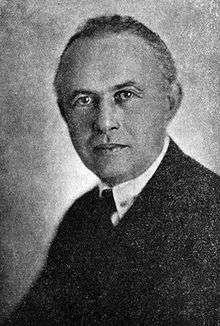Ivan Olbracht
| Ivan Olbracht | |
|---|---|
 Ivan Olbracht before 1929 | |
| Born |
Kamil Zeman 6 January 1882 Semily, Kingdom of Bohemia, Austria-Hungary |
| Died |
30 December 1952 (aged 70) Prague, Czechoslovakia |
| Occupation | Poet, journalist |
| Nationality | Czech |
| Notable works | Anna Proletářka |
| Spouse | Helena Malířová |
| Relatives | Antal Stašek (father) |

Ivan Olbracht (born Kamil Zeman) (6 January 1882, Semily, Bohemia – 20 December 1952, Prague) was a Czech writer, journalist and translator of German prose.
The son of writer Antal Stašek, Olbracht studied law and philosophy in Prague and Berlin. In 1905, he first began editing a social-democratic workers' newspaper in Vienna (Historical papers, Dělnické listy), and later he did the same in Prague (The people's right, Právo lidu). In 1921, Olbracht joined the Communist Party of Czechoslovakia and began working as a journalist, primarily for Rudé právo. He was twice imprisoned due to his communist views, first in 1926 (in Slezská Ostrava) and later in 1928 (in the Prague Pankrác Prison).
Education and career
Olbracht was a student of law, which he studied in Berlin and Prague. He left before graduation, however, choosing the career of a journalist. He began work as a journalist in a Czech Social Democratic paper in Vienna, writing for the paper between 1909 until 1916.[1]
Books
When he first began publishing his works, Olbracht was primarily a writer of stories and novels with a psychological theme. This phase of his writing life was before and during the First World War. After the war, however, he shifted his focus on journalism. His works after the War are an experimentation in blending fiction and realism.[1]
Olbracht wrote stories concerning the legends and people of sub-Carpathian Ruthenia, as well as reports concerning his journeys into the Soviet Union.
Politics
After the War, Olbracht was also increasingly drawn to politics, specially the radical side. In 1920 he lived in Soviet Russia for six months, became a member of the Communist party, and took up the job of editor of its paper Rudé právo. He was arrested for political agitation in 1926 and 1928.[1]
In 1929, together with six other writers, Olbracht signed a protest statement against the new leadership of the Czechoslovak Communist Party. The move resulted in ousting from the party and his editorial post. Removed from his political obligations and without a job, Olbracht turned his attention toward writing. The ensuing years were some of his most productive as a writer. Beginning in 1931 Olbracht started to travel regularly to Podkarpatská Rus, in the east of Czechoslovakia. The region, which was inhabited mostly by Rusyn peasants and Jews, created a deep impression on Olbracht's work. His experiences there inspired some of his best works. His book, Nikola Šuhaj, Outlaw, published in 1933 was based on a real person. The story spoke of a peasant outlaw who robbed the rich to provide for the poor. The book is widely regarded a masterpiece. It acquired the status of a folktale. Olbracht was awarded the his country's highest prize for literature for this book.
Later works
In 1934, Olbracht co-wrote the screenplay for Marijka nevěrnice (Marijka the Unfaithful). The following year, he published Hory a staletí (Mountains and Centuries), which was a combination of political ethnography and criticism of what he perceived as the Czechoslovak government's colonialist policies in Podkarpatská Rus. In 1937 Olbracht's book Golet v údolí (Golet in the Valley) came out. The book consisted of three interwoven stories about Orthodox Jews. The longest, and best, of the stories was Smutné oči Hany Karadžičové (The Sad Eyes of Hana Karadžičová), a sad tale of a Jewish girl who is ostracized by her village for marrying an atheist Jew. Golet in the Valley was the last of Olbracht's works. His books set in Podkarpatská Rus are regarded as his best works, reflecting his gift of combining documentary realism and fictional drama.[1]
World War II
Fear of persecution drove Olbracht to the small town of Stříbrec during World War II. There he once again joined the communist party and was active in the resistance. He worked for a while in the ministry of information after the war. His writings after the war were limited to adaptations, including retelling of Bible stories for children.[1]
Selected works
- Anna the Proletarian (Anna Proletářka)
- The Strange Friendship of Jesenius the Actor (Podivné přátelství herce Jesenia)
- Nikolai Schuhaj, Highwayman (Nikola Šuhaj loupežník)
- Grilled mirror (Zamřížované zrcadlo)
Films
